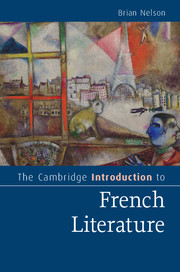Book contents
- Frontmatter
- Dedication
- Contents
- Preface
- Acknowledgements
- Chronology
- 1 Villon: a dying man
- 2 Rabelais: the uses of laughter
- 3 Montaigne: self-portrait
- 4 Corneille: heroes and kings
- 5 Racine: in the labyrinth
- 6 Molière: new forms of comedy
- 7 La Fontaine: the power of fables/fables of power
- 8 Madame de Lafayette: the birth of the modern novel
- 9 Voltaire: the case for tolerance
- 10 Rousseau: man of feeling
- 11 Diderot: the enlightened sceptic
- 12 Laclos: dangerous liaisons
- 13 Stendhal: the pursuit of happiness
- 14 Balzac: ‘All is true’
- 15 Hugo: the divine stenographer
- 16 Baudelaire: the streets of Paris
- 17 Flaubert: the narrator vanishes
- 18 Zola: the poetry of the real
- 19 Huysmans: against nature
- 20 Mallarmé: the magic of words
- 21 Rimbaud: somebody else
- 22 Proust: the self, time and art
- 23 Jarry: the art of provocation
- 24 Apollinaire: impresario of the new
- 25 Breton … Company: Surrealism
- 26 Céline: night journey
- 27 Sartre: writing in the world
- 28 Camus: a moral voice
- 29 Beckett: filling the silence
- 30 French literature into the twenty-first century
- Notes
- Further reading
- Index of authors and titles
- Index of genres, movements and concepts
- Cambridge Introductions to …
- References
30 - French literature into the twenty-first century
Published online by Cambridge University Press: 05 July 2015
- Frontmatter
- Dedication
- Contents
- Preface
- Acknowledgements
- Chronology
- 1 Villon: a dying man
- 2 Rabelais: the uses of laughter
- 3 Montaigne: self-portrait
- 4 Corneille: heroes and kings
- 5 Racine: in the labyrinth
- 6 Molière: new forms of comedy
- 7 La Fontaine: the power of fables/fables of power
- 8 Madame de Lafayette: the birth of the modern novel
- 9 Voltaire: the case for tolerance
- 10 Rousseau: man of feeling
- 11 Diderot: the enlightened sceptic
- 12 Laclos: dangerous liaisons
- 13 Stendhal: the pursuit of happiness
- 14 Balzac: ‘All is true’
- 15 Hugo: the divine stenographer
- 16 Baudelaire: the streets of Paris
- 17 Flaubert: the narrator vanishes
- 18 Zola: the poetry of the real
- 19 Huysmans: against nature
- 20 Mallarmé: the magic of words
- 21 Rimbaud: somebody else
- 22 Proust: the self, time and art
- 23 Jarry: the art of provocation
- 24 Apollinaire: impresario of the new
- 25 Breton … Company: Surrealism
- 26 Céline: night journey
- 27 Sartre: writing in the world
- 28 Camus: a moral voice
- 29 Beckett: filling the silence
- 30 French literature into the twenty-first century
- Notes
- Further reading
- Index of authors and titles
- Index of genres, movements and concepts
- Cambridge Introductions to …
- References
Summary
To Write: An Intransitive Verb?
– Roland BarthesIt becomes increasingly difficult, the closer we get to the present day, to have a clear sense of the enduring importance particular writers might acquire. In this chapter, which is organized in a loosely chronological manner, I will focus less on individual writers and texts, and more – though still highlighting emblematic figures – on some of the main currents of French literature since the middle of the twentieth century: formal experimentation, the use of traditional narrative forms for subversive purposes, writing by women, the rise of autobiography and the emergence of francophone writing; finally, I will discuss some significant figures in contemporary fiction.
New novel, new criticism
The 1950s and 1960s saw a wave of experimentation in French literature. Rejecting Sartre's advocacy of a ‘committed’, politically grounded art, writers reaffirmed art's self-sufficiency. Experiment in the field of narrative fiction reflected feelings of scepticism towards the conventions of the traditional realist novel established in the nineteenth century. A variety of novelists – notably Alain Robbe-Grillet (1922–2008), Michel Butor (b. 1926) and Nathalie Sarraute (1900–99) – came to be known as ‘New Novelists’. Although very different from each other, they all argued that nineteenth-century conventions like the omniscient narrator, linear plots and neat narrative resolutions give a false implication of the coherence and intelligibility of the world; and they questioned the presentation of characters in monolithic, well-defined terms on the grounds that such an approach distorts and oversimplifies human experience. Our lives, they wrote, do not follow strict storylines, with events and experiences unfolding naturally; and to suggest that we know fully what we, let alone other people, are thinking at any given moment is unrealistic. It was argued, most notably by Sarraute in The Age of Suspicion (L'Ère du soupçon, 1950) and Robbe-Grillet in For a New Novel (Pour un nouveau roman, 1963), that to represent the world as muddled, experience as discontinuous and characters as opaque is more true to life, and hence more realistic, than traditional fiction.
- Type
- Chapter
- Information
- The Cambridge Introduction to French Literature , pp. 223 - 242Publisher: Cambridge University PressPrint publication year: 2015

